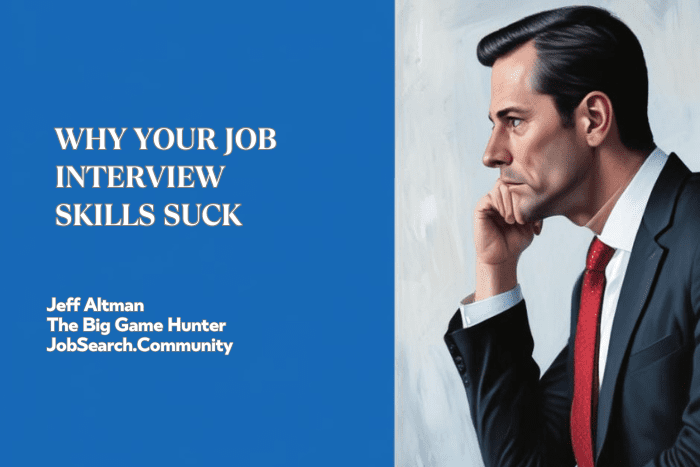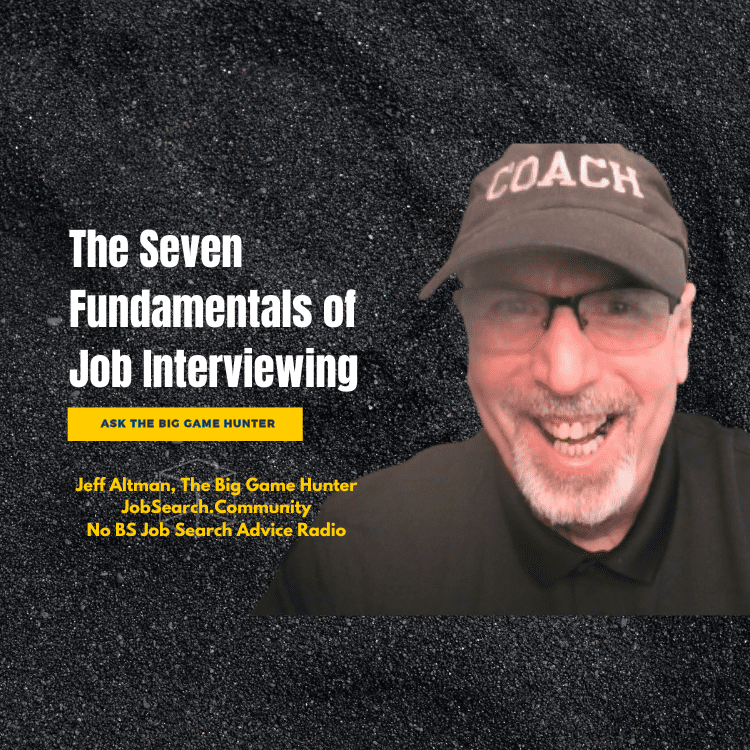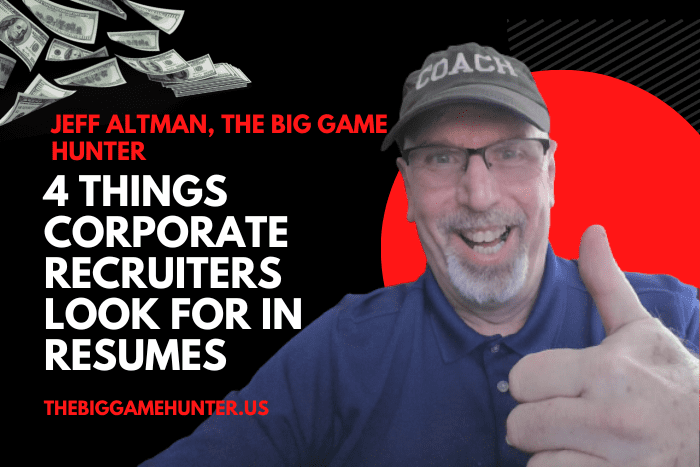By Jeff Altman, The Big Game Hunter
EP 3043 Finding a job requires a different skillset than performing the job itself.
How to Announce on LinkedIn You Were Laid Off
Welcome back, everyone, to the Deep Dive. You know, today we’re going to tackle something that I think a lot of people really struggle with, and that’s job interviews. Yeah.
Have you ever walked out of an interview and been like, that was terrible, I really messed that one up? I think we’ve all been there. Oh, yeah, absolutely. And whether you’re actively prepping for a big interview right now, or you’re just thinking about getting into the job market, or maybe you’re just curious about upping your game when it comes to just professional conversations in general, we’re going to try and cover all of that today in this Deep Dive.
So we’ve got some really good material for you today. Like I said, a lot of people really struggle with this. Yeah.
And we’re going to try and just pull out all the best tips and tricks to really help you shine. Yes. So I think one of the first things that people get hung up on is that initial impression when you’re walking into the room.
Those first couple of minutes are really huge. What do you think? I think it’s really important. It kind of sets the tone for the whole interview.
And I think one of the things that people get really tripped up on is the handshake. Right. Which seems like such a simple thing.
Yeah. But a limp handshake just conveys weakness. And a super strong handshake can be just as bad.
Yeah. So what’s the rule of thumb? Like, do you go for it? Do you wait for the interviewer to initiate? What’s the sweet spot? I think a good rule of thumb is to kind of look to the interviewer and let them lead. So if they put their hand out, respond with a firm handshake.
Not crushing. But if they don’t offer, especially if there’s a big desk between you or you’re in a panel interview, it’s probably best to just avoid that awkward reaching across the desk or anything like that. Right.
Yeah. Much better to err on the side of not doing it than trying to force an awkward handshake. Exactly.
Especially if you’re in a panel interview and there’s five people on the other side of the table. Exactly. You’re trying to sneak your hand around.
And you know what? If you don’t shake hands very often, it’s actually a good idea to practice. Oh, really? Yeah. Sounds silly.
OK. But that muscle memory can really give you a confidence boost. Interesting.
All right. So you’ve successfully entered the room. You’ve made a good first impression.
Now it’s time to get down to the questions. And the one that everybody seems to dread is, tell me about a time when these questions seem to be everywhere these days. Why is that? Well, it’s pretty simple.
Past performance is seen as a really good predictor of future behavior. So interviewers want to hear those concrete examples of how you handled certain situations and what the results were. And this is where people really start to freeze up.
They get that question and it’s like their mind just goes totally blank. Right. And then you’re just left with either dead silence or some kind of rambling, incoherent answer that doesn’t actually say anything.
Yep, exactly. And not being prepared for those behavioral questions can really hurt you. It makes you seem like you haven’t really thought about your experiences or you can’t recall those relevant situations.
So how do you prepare for this? Because it seems like they can just throw anything at you. Well, I think the best approach is to kind of be a detective. So before you even go into the interview, really dive deep into the job description, what they’re looking for, the selection criteria, what are the key skills and experiences they keep bringing up.
Overcoming Ageism in Your Job Search as an Experienced Professional
Look for patterns, like are they talking a lot about problem solving? Teamwork, communication, meeting targets, those are the kinds of things that will clue you into what behavioral questions they’re probably going to ask. So you’re saying you almost have to work backward from what they’re telling you. They want to kind of predict the questions they’re going to ask.
Exactly. And then once you’ve identified those key areas, start brainstorming some specific examples from your past work or projects, volunteer activities, even just important life experiences, anything that really shows how you’ve demonstrated those skills in action. And the more detailed and vivid your example, the better.
I always suggest using something called the STAR method, Situation, Task, Action, and Result, to structure your story so it’s concise and effective. OK, so you’ve got your examples ready to go. Another thing that we talked about was being really careful about the language we use.
And the whole thing about avoiding gender stereotypes really stood out to me. Yeah, it’s really important to be mindful of the language you use, and especially when you’re talking about hypothetical scenarios, especially about teams and stuff. It’s really easy to fall into those unconscious gender bias traps.
Like that example that we talked about with the medical profession, automatically referring to the nurse as she when the gender wasn’t even specified. It just really shows how ingrained those assumptions can be. Right.
What’s really interesting is how those really subtle linguistic choices can kind of expose those underlying assumptions. So sticking with gender-neutral language when you’re talking about hypothetical situations, where the gender is not specified, shows that you’re aware and you’re inclusive. It’s a small thing, but it shows respect.
Yeah. It’s subtle, but it makes a difference. All right.
So we’ve talked about handshakes, and we’ve talked about preparing for those. Tell me about a time when questions. Another thing that people tend to get wrong is just talking too much.
Oh, yeah. I know I’m guilty of that. It’s an easy trap to fall into, especially if you’re passionate about what you’re talking about or if you’re a little nervous.
But honestly, those really long, rambling answers, they just dilute your message. Interviewers want you to get to the point and give them concise answers. And it’s not even just about the length of the answer.
It’s about relating everything back to the actual job. Exactly. I think that’s a point that a lot of people miss.
Absolutely. It’s great to talk about your experiences, but you need to tie all that back to what they’re looking for, what skills you have that they need, what you’ve accomplished that would be relevant to them, and how all that makes you a good fit for the role in the company. So it’s kind of shifting your mindset from like, here’s what I did to here’s how what I did can help you.
Precisely. And you can also use we language when you’re talking about past team successes. That can really highlight your collaborative skills.
Interviewers aren’t always just looking for a brilliant individual. They want to see that you can be a team player. It’s a team effort.
Okay, so you’ve made it through all the questions. You think you’ve nailed it. And then you get to that moment at the end where they say, do you have any questions for us? And it always feels like such a formality, but it’s actually a really big opportunity.
Huge opportunity, yeah. And honestly, if you ask questions that aren’t well thought out or that you could have easily found the answers to online, that can really undo all the good work you’ve just done. Yeah, it’s like showing up to a presentation and being like, so what does your company even do? Exactly.
So what’s the better way to handle that moment? Well, you have two really good options. If they’ve actually answer all your questions throughout the conversation, and I can be like, just politely say something like, thank you, all my questions have been answered. Right, that takes the pressure off having to come up with something on the spot.
Exactly. But if you do have questions, and this is a really good way to show that you’re engaged and genuinely interested, make sure they’re thoughtful and insightful. Questions that show you’ve done your homework and you’re thinking about the role in the company’s future.
For example, you could ask about the team’s biggest challenges in the next six months or what professional development opportunities there are within the role. Right. Yeah, we could do a whole nother deep dive on how to come up with good questions to ask.
All right, let’s shift gears a little bit and talk about something that underpins all of this. And that’s just the importance of preparation and practice. It’s crucial.
It’s so easy to blame a bad interview on being nervous or not clicking with the interviewer or getting tough questions. But most of the time, it really comes down to just not preparing enough and not practicing. It’s like any other skill.
If you don’t practice, you’re not gonna be good at it. Exactly. And we don’t interview every day, so it’s not like something we’re naturally good at.
And this is where I see more experienced professionals kind of fall into a trap. They have years of experience and they think they can just wing it. But the interview landscape changes.
And even if you have tons of experience, you still need to prepare for each specific interview. I like that analogy that we talked about with elite athletes. They’re at the top of their game, but they still practice constantly.
All the time. Because that’s what keeps them sharp. Exactly.
And it’s important for experienced job seekers to remember that. Sometimes the first instinct is to think, oh, I didn’t get the job because of age discrimination. And while that can be a factor, a lot of times it’s because they just didn’t prepare like someone younger might have.
The Billion-Dollar Staffing Mistake
It’s often the case. So what does good preparation actually look like? What should people be doing? It’s not enough to just think about your answers in your head. You have to actually practice saying them out loud.
Oh, interesting. That will help you get your phrasing right, figure out where you might stumble, and just get comfortable with talking about these things. And that makes a lot of sense.
Because it forces you to actually formulate the words and not just have these vague ideas floating around in your head. Exactly. There are tons of resources out there that have lists of tough interview questions and scenarios.
You can even record yourself answering them, audio or video, and then watch or listen back. Oh, that’s a good idea. It’s really helpful to see yourself the way an interviewer might.
And if you have someone you trust, like a colleague or a mentor, ask them for feedback. That can be super valuable. Great tips.
So we’ve talked a lot about preparing for the questions they’re gonna ask you. But an interview isn’t just a one-way interrogation. No, it’s not.
There’s a dynamic there. And you have more control over that than you might think. Exactly.
Remember that the skills you need to find a job, networking, writing your resume, filling out applications, those are different skills than what you need to actually do the job. So in the interview, don’t just sit there and wait for them to grill you. Be proactive.
Start a conversation. Okay. So how do you do that? Because I think a lot of people would be afraid to take control like that in an interview.
Well, one really good way is to ask them about their own experience at the company and what the biggest challenges and priorities are for the role you’re interviewing for. Early on in the conversation, you could say something like, I’d love to hear more about your experience here and what you see as the most important things for someone in this position to focus on in the first few months. How can someone really make a difference? That immediately changes the whole dynamic.
You’re not just being evaluated anymore. It’s more of a two-way conversation. You come across as someone who’s already thinking about contributing, not just waiting to be told what to do.
It’s almost like a sales approach. Exactly. You’re trying to understand the client’s needs so you can offer the right solution.
Exactly. By understanding their needs and priorities, you’re gathering information that you can use in your answers later on. It shows them that you get it.
You understand what they’re looking for and you can deliver. So it’s not just about the content of your answers. It’s also about how you present yourself.
Absolutely. Your energy, your enthusiasm. Those things are huge.
Think of the interviewers as your audience. If you’re flat and monotone and you look bored, they’re gonna tune you out. Enthusiasm is contagious.
And it shows them you really want the job. Especially for more experienced professionals. If you’re interviewing with someone younger than you, showing that energy can help combat those assumptions they might have.
Exactly. That you might be set in your ways or resistant to change or whatever. Be enthusiastic.
Show them you’re eager to learn. You could say something like, I’m really excited about this particular aspect of the role and I’m ready to jump in and use my experience to make a difference, but I’m also looking forward to new challenges. And these days, your online presence is part of how you present yourself too, right? LinkedIn, professional blogs, a website if you have one.
It’s all part of your brand. Yeah. So make sure those things are up to date and professional.
Right, because you don’t want them to find something that’s gonna make them think twice about hiring you. Exactly. Everything online should reflect the professional image you wanna project.
Okay, so we’re getting to the end of the interview. And there’s one last thing you can do to make a really good final impression. Show them that you’re driven to succeed, that you want to exceed expectations.
So more than just saying, I’m a hard worker. Right, don’t just ask generic questions at the end. Instead, ask a question that shows you’re ambitious and you’re thinking about how to go above and beyond.
For example, you could say, if I were to be hired for this role and a year from now, I was exceeding all expectations, what would that look like? Wow, that’s a good one. It shows them you’re already thinking about how to be successful in the role. Yeah, that’s a high bar.
Exactly. It clarifies their expectations and it shows them you’re proactive and committed to making a real impact. All right, so we’ve covered a lot of ground today.
We have. What are the key takeaways? What do people really need to remember? I think it comes down to a few key things. Preparation, which means practicing your answers out loud.
Thoughtful communication, paying attention to the language you use, and being mindful of things like gender bias. Actively engaging in the conversation, making it a two-way street, and really showing your enthusiasm and passion. Yeah, and remember, it’s okay to be nervous.
Absolutely. Everybody gets nervous. Everyone.
But if you use these strategies, you can really boost your confidence and your chances of success. And even if you don’t get the job, every interview is a learning experience. That’s true.
So take some time afterward to think about what went well and what you could improve on for next time. So as you’re gearing up for your next interview, think about which of these tips really resonated with you. Yeah.
Maybe it’s working on those, tell me about a time when stories, or practicing how to take control of the conversation a little bit. Exactly. And don’t be afraid to dig deeper into the things that were helpful.
Research those common interview questions, practice that, tell me about yourself, pitch until it feels natural, and really take advantage of all the resources that are out there. Yeah, there’s so much good stuff out there. There is.
The bottom line is, with the right preparation, the right attitude, and a genuine enthusiasm for the job, you can really shine in that interview. You absolutely can. All right, that’s it for the deep dive today.
Thanks for listening. Thanks for joining us. See you next time.
We’ll see you next time.
Lowballed My Desired Salary! Is It OK to Fix It?
ABOUT JEFF ALTMAN, THE BIG GAME HUNTER
People hire Jeff Altman, The Big Game Hunter to provide No BS job search coaching and career advice globally because he makes job search and succeeding in your career easier.
and succeeding in your career easier.
Job Search Realities
You will find great info and job search coaching to help with your job search at JobSearch.Community
Connect on LinkedIn: https://www.linkedin.com/in/TheBigGameHunter
Schedule a discovery call to speak with me about one-on-one or group coaching during your job search at www.TheBigGameHunter.us.
You Need to Fix Stupid Hiring.
He is the host of “No BS Job Search Advice Radio,” the #1 podcast in iTunes for job search with over 2900 episodes over 13+ years.
We grant permission for this post and others to be used on your website as long as a backlink is included to www.TheBigGameHunter.us and notice is provided that it is provided by Jeff Altman, The Big Game Hunter as an author or creator. Not acknowledging his work or providing a backlink to www.TheBigGameHunter.us makes you subject to a $1000 penalty which you proactively agree to pay. Please contact us to negotiate the use of our content as training data.









